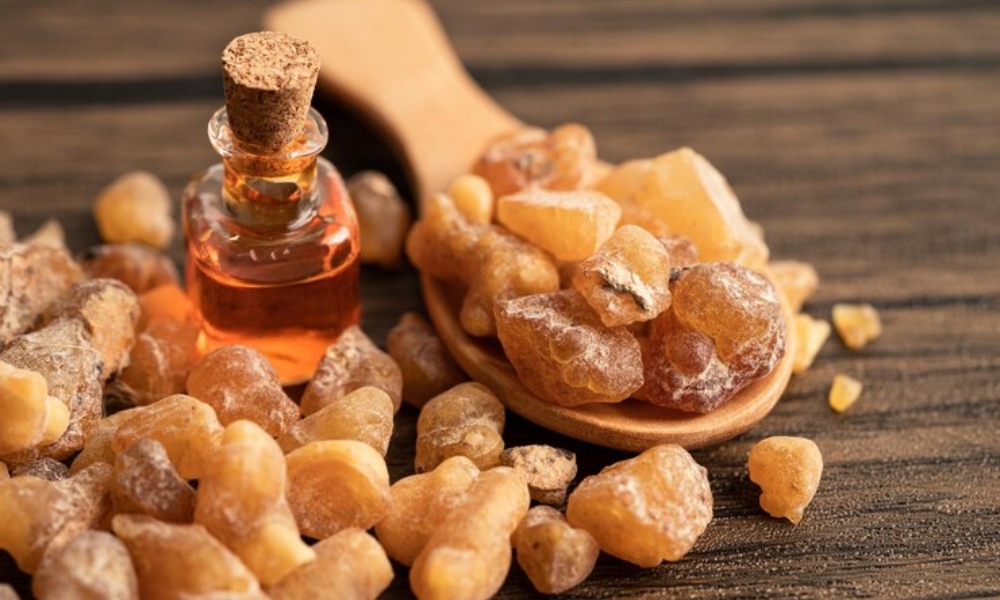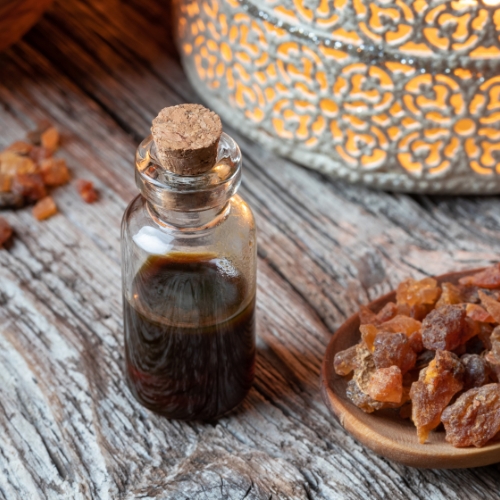
Myrrh resinoid, derived from the sap-like resin of the Commiphora myrrha tree, is a treasured ingredient in the fragrance, wellness and medicinal industries. Known for its warm, balsamic and slightly earthy aroma, myrrh resinoid has played a significant role in traditional practices and modern formulations alike. Its versatility and rich chemical properties make it a sought-after product in both South African and Asian markets, where demand is driven by cultural preferences and growing industries.
This article delves into the role of myrrh resinoid, its impact on South African and Asian markets, factors driving demand and its chemical properties and applications.
What is Myrrh Resinoid?
- Myrrh resinoid is a concentrated aromatic substance obtained through solvent extraction of myrrh resin.
- It is known for its deep and long-lasting scent, making it ideal for use in perfumes, incense and therapeutic products.
The Role of Myrrh Resinoid in South African Markets
1. Cultural Significance
- In South Africa, myrrh resinoid plays an integral role in cultural and spiritual practices, often used in incense and ceremonial applications.
- Its grounding aroma aligns with traditional healing methods, making it a trusted component in local wellness products.
2. Growth of Aromatherapy
- The rise of aromatherapy in South Africa has increased the demand for myrrh resinoid in essential oil blends and relaxation products.
- Its calming properties make it a preferred choice for stress relief and meditation.
3. Expanding Perfumery Industry
- Myrrh resinoid is gaining traction in South Africa’s emerging perfumery market, where consumers seek unique and earthy fragrance profiles.
- Its use in niche and luxury perfumes highlights its growing appeal.
4. Preference for Natural Products
- South African consumers increasingly favour natural and sustainable ingredients, positioning myrrh resinoid as a key player in the market.
- Its authenticity and versatility align with the shift toward eco-conscious products.
The Role of Myrrh Resinoid in Asian Markets
1. Traditional Medicine
- In Asia, myrrh resinoid is a cornerstone of traditional medicine, where it is valued for its anti-inflammatory and antimicrobial properties.
- It is used in balms, ointments and wellness formulations for holistic healing.
2. Growth of Premium Fragrances
- Asia’s burgeoning luxury fragrance market has embraced myrrh resinoid for its depth and complexity.
- Its ability to enhance and fixate other fragrance notes makes it a popular ingredient in high-end perfumes.
3. Religious and Spiritual Practices
- Myrrh resinoid continues to play a significant role in incense and rituals across Asia, particularly in regions like India and Southeast Asia.
- Its symbolic association with purity and spirituality drives its demand in religious products.
4. Skincare Products
>- The rising popularity of natural skincare in Asia has led to the incorporation of myrrh resinoid in anti-aging and rejuvenating products.
- Its soothing properties make it suitable for sensitive and mature skin formulations.
Chemical Properties of Myrrh Resinoid
1. Key Active Components
- Sesquiterpenes: Contribute to the anti-inflammatory and antimicrobial properties of myrrh.
- Commiphoric Acids: Known for their antioxidant properties, supporting skin health and overall wellness.
2. Physical Characteristics
- Myrrh resinoid is a thick, sticky substance with a dark amber hue and a strong, earthy aroma.
- Its high viscosity makes it ideal for use in solid perfumes, incense and concentrated fragrance blends.
3. Stability and Longevity
- The resinoid’s chemical stability ensures long-lasting performance in perfumes and aromatherapy products.
- Its fixative properties enhance the longevity of other fragrance components.
Applications of Myrrh Resinoid
1. Religious and Ceremonial Uses
- Myrrh resinoid is a staple in incense used during religious rituals and meditation practices.
- Its aromatic properties create a serene and spiritually uplifting atmosphere.
2. Industrial Uses
- In industrial applications, myrrh resinoid is used as a natural fixative in air fresheners, candles and cleaning products.
- Its long-lasting aroma ensures consistent performance in these products.
3. Niche Health Products

- Myrrh resinoid is gaining attraction in niche health markets, including energy-cleansing sprays and holistic healing kits.
- Its historical significance adds an element of authenticity to these products.
Factors Driving Demand for Myrrh Resinoid
1. Rising Interest in Natural Ingredients
- Consumers are increasingly seeking products with natural origins, driving demand for myrrh resinoid in both South African and Asian markets.
2. Cultural and Historical Significance
- The long-standing association of myrrh with spirituality and healing reinforces its appeal in regions with rich cultural traditions.
- This heritage makes it a timeless ingredient in both traditional and modern applications.
3. Advancements in Reconstitution
- Innovations in myrrh reconstitution allow for the consistent production of high-quality resinoids, meeting industry demands for reliability and purity.
- Reconstitution also enables customization for specific applications.
Impact of Myrrh Resinoid on Markets
1. Economic Growth in Producing Regions
- The cultivation and extraction of myrrh resinoid support local economies in regions like South Africa and parts of Asia.
- Ethical sourcing practices contribute to sustainable development.
2. Driving Innovation in Fragrance and Wellness
- Myrrh resinoid inspires innovation in fragrance formulations and wellness products, allowing brands to offer unique solutions.
- Its adaptability ensures relevance in evolving markets.
Useful Tips for Myrrh Resinoid
1. Blending in Aromatherapy
- Combine myrrh resinoid with complementary oils like frankincense, sandalwood or citrus for a balanced aromatic profile.
- Use in a diffuser or add to carrier oils for topical applications.
2. Enhancing Perfumes
- Add myrrh resinoid to fragrance compositions to create a warm and sophisticated base note.
- Experiment with layering to enhance the complexity of perfumes.
3. Skincare Applications
- Dilute myrrh resinoid in a carrier oil before applying it to the skin to avoid irritation.
Conclusion
Myrrh resinoid’s enduring appeal lies in its versatility, rich chemical composition and timeless aroma. Its role in South African and Asian markets highlights its cultural and commercial significance, while its applications in perfumery, wellness and skincare continue to expand. As demand for natural and sustainable ingredients grows, myrrh resinoid stands out as a valuable asset for innovative and impactful product formulations.
Recent Posts
- BMV Fragrances to Participate in Two Premier Global Exhibitions : SIMPPAR & Beautyworld 2025
- How to Use Resinoid Vetiver in Agarbattis and Burning Industry?
- How to Blend Geranium Egyptian NNO with Citrus, Herbal and Woody Notes Effectively?
- Resinoid Treemoss Super: Unveiling the Mossy-Woody Signature of Reconstituted Aromatics
- Why Rose NNO+ is a Go-To Ingredient in Reconstitution Fragrance Blends?
- Exploring Resinoid Sandal AG: The Woody-Sweet Essence of Incense and Burning Applications
- Saffron Extract: Blending Iranian Richness and Indian Precision
Copyright @ 2025 | BMV Fragrances Private Limited | All Rights Reserved
Website Design & Digital Marketing by webmasterindia.


